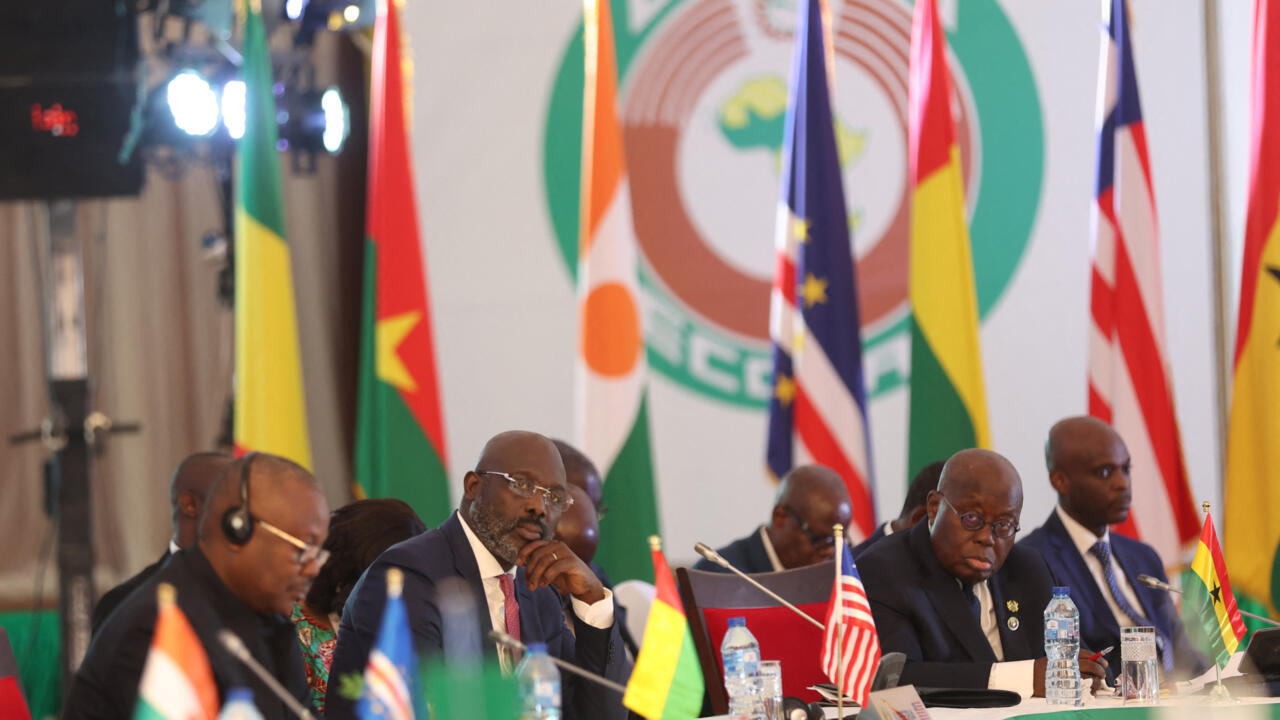The scene takes place in December 2023 in Abuja, Nigeria, during the last summit of ECOWAS heads of state. In a hermetically sealed room, the closed session begins. Niger, a country whose democratically elected head of state was overthrown five months earlier, is the main issue at this meeting. The representative of Benin speaks: "We must reconsider our demands, if (Nigerian President) Mohamed Bazoum is released and if the National Council for the Protection of the Homeland (CNSP, body created by the junta, NLDR) submits a sheet of road".
Wrapped up in one of the traditional outfits he likes, with a cap screwed on his head, the President of Nigeria, Bola Tinubu, and current president of ECOWAS, wanted, according to witnesses, to be more precise on the situation in Niger: "The CNSP can keep power, but these soldiers must free President Mohamed Bazoum." Gone is therefore the threat of a possible military intervention in Niger, brandished five months before by ECOWAS.
“This affair of intervention and then non-intervention has once again discredited ECOWAS. The same Bola Tinubu, who had mobilized all the heads of state of ECOWAS for this intervention, made an about-face and, from then on , everyone backed away. This gave the impression of an institution that does not respect its word, an institution without weight", analyzes Oumar Kanouté, a young Ivorian sociologist.
This lack of authority caused a Ghanaian diplomat who wished to remain anonymous to react: “ECOWAS must reinvent itself or disappear. When the Nigerien soldiers who carried out the coup realized that intervention was no longer necessary. Today, they have decided to settle down for the long term, to turn their backs and strengthen their relations with the Malian and Burkinabe juntas.
Three juntas slam the door
The lack of firmness of the regional institution, whose member countries no longer speak with the same voice, allowed the three juntas of the Sahel (Mali, Niger and Burkina Faso) to come together and recently slam the door of this organization . Last September, they had already created the Alliance of Sahel States (AES), a mutual defense pact.
The announcement of their departure from ECOWAS was made on January 21, 2024. The next day, the Malian Minister of Foreign Affairs, Abdoulaye Diop, flew to Lomé. There, he was received by President Faure Gnassingbé, head of state of the sub-region the most popular in the eyes of the three juntas of the Sahel.
“Togo has a more human, more realistic approach to our situation. It is a brother country that understands us, unlike others,” Nigerien Minister of the Interior, General Mohamed Toumba, recently told France 24. , an influential figure in the National Council for the Safeguarding of the Homeland (CNSP), during a trip to Lomé.
A joint force based in Nigeria
One of the criticisms made of ECOWAS by the Alliance of Sahel States (AES) is the lack of solidarity of the regional organization in the face of terrorism and insecurity in the sub-region.
"Certainly, ECOWAS last year gave a check for 1.9 million dollars to Mali, Niger and Burkina Faso, as part of the fight against terrorism, but where are the anti-terrorist forces of which we has been speaking to us since?" asks Mamadou Samaké, Malian lawyer.
In this area, two initiatives overlap and, for years, ECOWAS has not been able to decide or harmonize strategies. The first project is a force of around 2,000 men whose number will increase in 2023. This ECOWAS Standby Force (FAC) is the heir of Ecomog, the ECOWAS intervention force, created in 1990 to intervene in Liberia, a country then in the grip of a civil war.
The FAC, launched in 2004, is made up of soldiers, police officers and civilians from ECOWAS countries. Twenty years after its creation, its results? The FAC briefly intervened in Mali in 2013 to help the regime fight against jihadists in the north of the country, before the intervention of French forces as part of Operation Serval, the ancestor of Barkhane.
The FAC also intervened in 2017 in Gambia to oust from power the outgoing president, Yahya Jammeh, who refused to leave his post after Adama Barrow's victory in the presidential election. Theoretically, the men of this force can be mobilized at any time in external theaters. Its staff meets in Abuja, Nigeria, the main power of ECOWAS.
A glaring lack of efficiency
The Accra Initiative is the second regional project which aims to fight terrorism and stem the progression of jihadist groups towards the south. It was discreetly launched in 2017 by the Gulf of Guinea countries. Benin, Burkina Faso, Ivory Coast, Ghana, Togo, Mali and Niger are the main members and observers of this security alliance.
This project has three dimensions: sharing of information, training of personnel, as well as the establishment of joint cross-border military operations. Operations which are not directly directed against jihadist groups, but against their supply and financing chains.
Therefore, due to a lack of harmonization of visions and actions, the common fight against insecurity and terrorism is failing. Jihadists continue to terrorize populations. Several states no longer control a significant part of their territory.
Maître Moctar Ndiaye, lawyer at the Dakar bar, says he is worried: “We generally create organizations for the sake of form. The fight against terrorism and insecurity in our space is a real illusion, for the moment. It does not work. However, we need an ECOWAS for defense and security. Today, within a Schengen area country, if a man is wanted for a crime committed or for terrorism, there is chaos. For us, it's far from being established."
The France 24 summary of the week
invites you to look back at the news that marked the week
I subscribe
Take international news everywhere with you! Download the France 24 application

